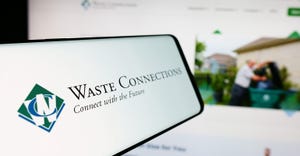Grocery Manufacturers Association Uses Storytelling to Promote Sustainability and Food Waste
The Grocery Manufacturers Association (GMA) is a trade association that has been representing the leading food, beverage and consumer product companies in the U.S. for more than 100 years, and it notably uses storytelling to promote sustainability and to provide nutritious, affordable and high-quality foods to both the U.S. and the world.
In 2011, GMA launched the Cross-industry Food Waste Reduction Alliance, which is a standalone project that GMA runs with its retail trade association partners and the National Restaurant Association (NRA) to address the challenge of food waste in the U.S.
Waste360 recently spoke with Meghan Stasz, GMA’s senior director of sustainability, about the association’s sustainability and food waste efforts. Stasz will be moderating a panel on how the industry is working to reduce and divert food waste across the supply chain at WasteExpo’s brand new Food Recovery Forum in June.
Waste360: Tell us a little bit about your role within GMA.
 Meghan Stasz: I have been GMA’s senior director of sustainability for about six years, and I have a background in environmental non-governmental organization. I was working on agriculture issues for the Environmental Defense Fund for a number of years before completing my master’s degree and joining GMA.
Meghan Stasz: I have been GMA’s senior director of sustainability for about six years, and I have a background in environmental non-governmental organization. I was working on agriculture issues for the Environmental Defense Fund for a number of years before completing my master’s degree and joining GMA.
At GMA, we do a lot of storytelling about the food, beverage and consumer products industry’s sustainability story, which is an aggregate on what the whole consumer packaged goods (CPG) industry is doing both domestically and globally on all of the big-bucket sustainability issues. We then offer this storytelling to stakeholders.
We also do a series of reports, an annual sustainability conference and a number of other mechanisms around both our interests and our expertise. We then launch specific projects around those topics. Right now, we have a few projects that focus on sustainable agriculture, packaging, recycling and food waste
Waste360: How is GMA helping reduce and divert food waste?
Meghan Stasz: The major thing that we are doing is via the Cross-industry Food Waste Reduction Alliance, which is made up of about 30 companies. The alliance has three overall goals:
To reduce the amount of food waste that is being generated in our operations.
To increase the amount of food that is being donated to those in need.
To divert as much waste as we can from the landfills and to increase the amount of material that is recycled.
In order to hit these goals, we do an assessment to gather data from the manufacturing, retail and restaurant sectors every other year. This assessment allows us to understand how much food waste our industry is generating, where the waste is going and how much food we are donating.
From that assessment, we were able to find out that the manufacturing sector is recycling almost 94 percent of food waste from our operations, which is a phenomenal story.
We also do a best practices guide every other year, which is a series of case studies, templates and examples written by companies for other companies to help them either get started on a food waste reduction or donation program or take their program to the next level. These guides and our other downloadable tools are available on the Cross-industry Food Waste Reduction Alliance website.
In addition to those two projects, we also do a number of initiatives with other companies to raise awareness about food waste. We are also looking into some policy options to help generate more infrastructure options, which will increase the opportunities to recycle food waste in the U.S.
Waste360: What are the association’s goals for this year?
Meghan Stasz: We will be doing another assessment this year. With this assessment, we want to see more companies participating than in past years. In addition to that, we also want to see that companies are more confident in the data that they are providing to us about how much food waste they are generating.
To us, that means that companies are starting to measure their food waste. Once they start doing that, they will find immediate opportunities to reduce food waste. Just like the saying says, “you cannot manage what you don’t measure.”
Waste360: Some zero-waste grocery stores are popping up across the world. Are you involved in any of those efforts or do you plan to be?
Meghan Stasz: I think that zero is a big number and a really difficult number to achieve. I think any time that we can encourage a business to reduce the amount of food waste that they are generating is a good thing.
On some level, getting down to absolutely zero might not be feasible, but that doesn’t mean that we shouldn’t start measuring what we are generating or find opportunities to reduce food waste.
In a triple-bottom-line world, I think that there is a real opportunity to benefit business environments and societies to reduce waste and try to get as close to zero as we can.
Waste360: You are moderating a panel at WasteExpo. What are you hoping to get out of the panel and what topics are you hoping will come up?
Meghan Stasz: I am really excited about the variety of the speakers. We have this great lineup of retailers, manufactures and representatives from the dairy industry, but I think that one of the things that the audience will really get out of this session is concrete examples of what the business and food industries are doing to reduce food waste.
Infrastructure is one of the things that limit the amount of food waste being reduced and being sent to the landfill. Increasing infrastructure options is going to be the key to success in that area.
The WasteExpo audience is a great audience to share this message with because they are solutions oriented and full of really smart ideas about how to solve some of the food waste problems. By hearing some of the challenges that companies are currently facing, I think there could be some great ideas sparked by the audience.
About the Author
You May Also Like




